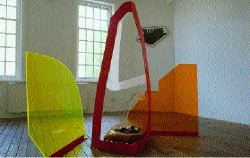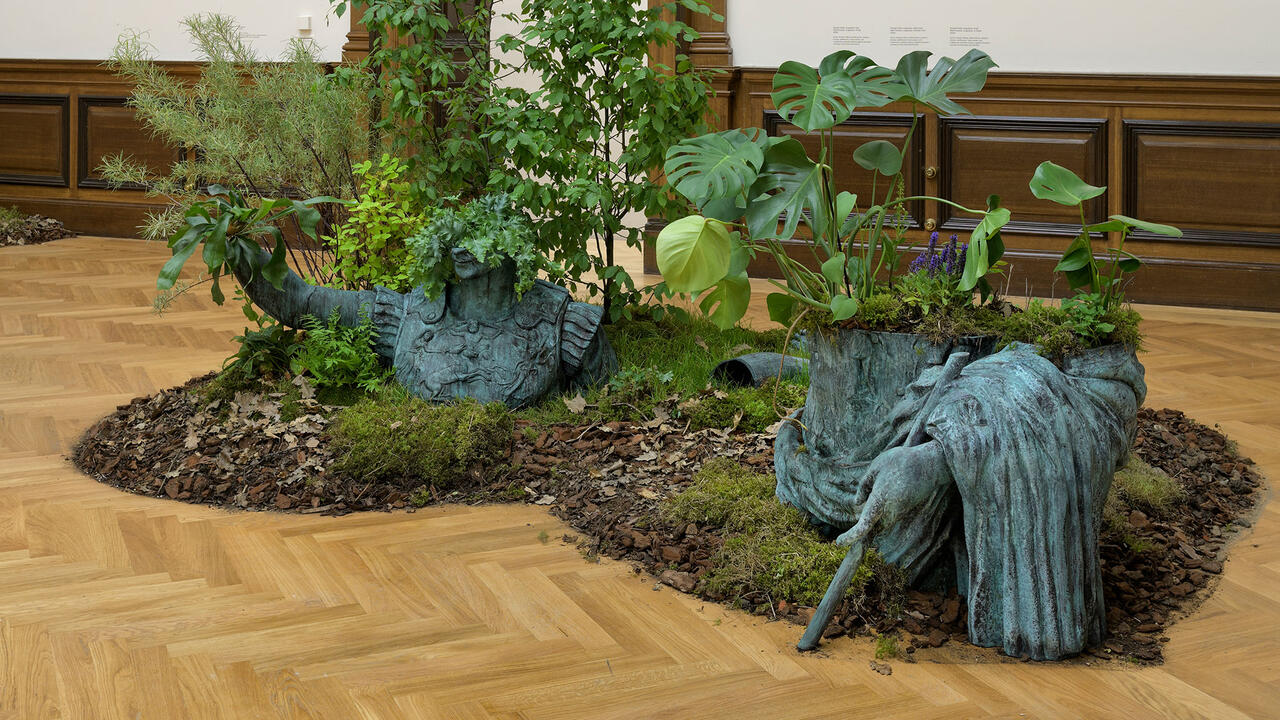Keith Farqhuar and Gary Webb
The Approach, London, UK
The Approach, London, UK

Like the English invention crème brulée French can add a classy gloss or sarcastic barb to to something which sounds clumsy in its original language (burnt cream?). Entitled 'Nouveau Riche', Gary Webb and Keith Farquhar's collaboration sits sarcastically in the show's disparaging register - 1980s pretension fuelled by money and little sense - to posit language as both propagant and stumbling block of art's aspirations to a universally understandable form.
If the 1980s revival is back, and wall-to-wall shagpile carpeting was the 80s sign you'd arrived, then The Approach must be doing pretty well for itself. Keith Farquhar's Order for The Approach (all works 2000) covered half the gallery floor in soft, luxurious carpeting. Split diagonally, the red and white halves met like a spread from a Constructivist Wallpaper* designed by Kasimir Malevitch.
Hanging on the wall across the room from this deluxe floor covering was another Farquhar, Charisma Poem No.3; Empathy. Shaped like a skewed polygon, it is inscribed with the sentence 'This is our empathy for the upper classes and Brideshead Revisited'. The words rush out at you, leaving trails like the credits of a superhero film or cheap light entertainment programme. So what, exactly, is this empathy, this conduit to mental identification - the print, the show? Words, more than anything, I guess. Brideshead Revisited conjures up very specific associations in Britain. Evelyn Waugh, self-confessed author of England's forelock-tugging infatuation with aristocratic privilege (courtesy of the BBC), once said 'I regard writing not as an investigation of character but as an exercise in the use of language.' So, his chronicle of doomed, gilded youth was just a formal device?
Two works by Gary Webb grapple with this idea of content's subservience to form, functioning as the pivot upon which Farquhar's surreally acerbic works move. In Love on Rocks, three angular pieces of coloured Perspex form an asymmetrical triptych. At the base of the central structure, a mini-disc and speaker rest on the smooth, metallic surface of an amorphous, plastic lump, which plays a hilarious recording of a Pythonesque con-versation conducted in foreign tongues; impressions of what French, German, Russian or Italian might sound like to someone with no knowledge of the vocabulary or grammar - a bit like Brits on holiday talking loudly in a foreign accent, feebly attempting to make themselves understood. The effect is a comically pitiful Esperanto, an international language of onomatopoeia, referencing surface rather than content that would have had Esperanto's creator, Ludwig Zamenhoff, spinning in his grave. The angularity of the surrounding Perspex forms is more geometric than jaggedly aggressive. Echoing the shape of the framed works around them, they function like spoof language recordings - an international art language articulating some deliberately dated notion of what pan-European, hip, avant-garde Formalism should look like, without explicitly parodying any identifiable style. For the Artist, with its cut-outs of punctuation marks and mathematical symbols, suggests a set of standard linguistic tools for the Modern artist about town, sitting somewhere between a toy and the decoration of a budget magician's robe - master of universal language.
There's a looseness to the associative games at play here that's almost druggy in tone. Owls' Crime Squad, a curious painting that looks like a school blackboard sits happily in a hermetic universe of its own. Impenetrability aside, it's that same trippy slackness and humour that gives the show its bite. The pastel colours and stencil lettering of City of Architecture and Design takes a snide swipe at Glasgow's cosmopolitan self-image. It's almost as withering as nouveau riche.
The last line of Charisma Poem No. 4; She Said is 'She said her orgasms were the communist'. Waugh wrote Brideshead Revisited amid the privation of ration orders Britain, claiming it was an exercise in decadence and verbal gluttony to stave off nagging hunger. Webb and Farquhar assume the mantle of nouveau riche pretension to dig at artistic deficiency or uncertainty, but manage to do so in a manner that goes beyond mere 'Emperor's new clothes' finger-pointing.

























